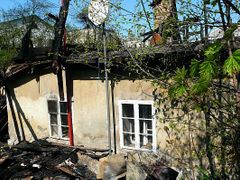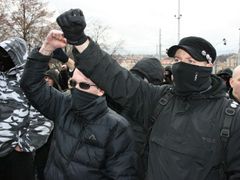
Prague - Patrik Vondrak has used the word "unadjusted" at least ten times in the past half hour.
He is referring to the Roma (gypsies) in the Czech Republic, a group that has long faced social exclusion and discrimination throughout Europe, and it is clear that he's choosing his words carefully as he speaks to a class of American journalism students at New York University in Prague.
"We want the law of the Czech Republic being enforced. And because of political correctness, the law is enforced in the majority of society, but not for the unadjusted minorities," says the 26-year-old. Vondrak heads the Prague branch of Delnicka strana (Workers' Party), an extremist political group, according to analysts, with alleged connections to the country's growing neo-Nazi movement.
There is a stark dichotomy between the face of the Workers' Party - as illustrated by Vondrak seeking not to offend a multi-ethnic group of Americans - and the hatred the party and its allies covertly promote.
As the economic crisis worsens in Europe and anti-Roma and anti-minority groups like the Workers' Party become more vocal and even violent, governments are struggling to find ways to suppress them, with banning considered a key option.
In April, unknown assailants firebombed a Roma house in the Czech town of Vitkov, leaving a two-year-old Roma with severe burns on 80 percent of her body. In Hungary, seven Roma have been killed over the past year in shootings.
Authorities worry that the attacks in both countries were driven by racism.
"We are one step from a racial war in this country," said Jan Urban, a professor and former anti-communist dissident in the Czech Republic who frequently writes about political extremism. "The Roma community has said to the government, 'if you don't do something, we will defend ourselves.'"
The question remains, would banning political parties like Vondrak's encourage or dilute racism?
Proponents of banning believe the Workers' Party is growing at a dangerous rate and must be stopped, while others believe banning will only force neo-Nazis to hide their true colors and attract a secret following the police will be unable to track.
An attempt by the Czech government to ban the Workers' Party was rejected by the Supreme Administrative Court in March.
Already, there is evidence that the current Czech legal framework, which bans expressions of sympathy for fascism and limits the rhetoric of the Workers' Party, has not discouraged support for its anti-gypsy stance.
"Nobody knows exactly how many members this party has," said extremism expert and political science professor Zdenek Zboril, "but it is significant that the popularity of this party is going up. This party is prepared to accept a very populist policy - and a political, economic or moral crisis could help them."
The identity of far-right groups is often fluid and cloaked in secrecy, with estimates of the Workers' Party membership ranging from 60 to several hundred.
In 2004 regional elections, the party won 8,000 votes, or about 0.1% of the electorate. The number rose to 13,000 in 2006, and in last year's regional elections support grew to over 28,000.
In June, the party will run in the European Parliament elections. Although most analysts doubt that the Workers' Party will get any seats, a Social Democratic MP, speaking off record, said he expected that it would eventually get enough votes in national elections to enter the Lower House of Parliament.
Courting favor with a frustrated electorate
In former communist countries such as the Czech Republic, gypsies struggle with many social disadvantages, including unemployment rates of up to 90 percent, poor housing and drug problems. Gypsies account for an estimated 2 percent of the 10.2 million people living in the Czech Republic.
The financial crisis has sharpened a sense of unfairness many Czechs feel about government aid for gypsies, who have had a difficult time with the transition towards to a market economy after decades of Communist state support.
It is within this environment that the Workers' Party has been marching on Roma housing ghettos with greater frequency.
Vondrak and his colleagues organized several marches against a Roma housing ghetto in the northern town of Litvinov that culminated in violent clashes with the police in March, an event that was the catalyst for the Czech government's move to try to ban the Workers' Party.
The march was urged on by non-Roma residents of the town, to the shock of international rights groups.
"This was the first time I saw local residents involved in the scene," said Zboril. "This was a turning point."
The Workers' Party claims it is supporting the "law abiding people" of Litvinov, following reports that those living on the housing estate violate sanitary regulations, disturb their neighbors with loud noise, and have illegal connections to an electrical grid.
"We received a lot of emails after one of our marches from people in other parts of the country asking us to come to their towns to help them show that they have these problems too," Vondrak told the New York University in Prague class.
Photos of Vondrak on Antifa.cz, an anti-fascist/Anarchist website, offer some insight into what Workers' Party members get up to when they believe they are not at risk of exposing themselves to prosecution.
One shows him wearing a t-shirt with the insignia of Narodni Odpor (National Resistance), a clandestine neo-Nazi group. Overt support of Nazism, as well as the display of Nazi symbols, is against the law in the Czech Republic and several other countries in Europe, including Germany.
Another photo shows him in a group of young men all wearing the t-shirt, some of whom are giving the "Sieg Heil" Hitler salute.
However, when a New York University student asked how Worker's Party ideology compares with Hitler's National Socialism, Vondrak denied any connection.
"They talk about racial separation, we talk about cultural separation. I do think that cultural separation is a good thing, but I don't think it has anything in common with Adolf Hitler," he coolly replied.
Heil Hitler and Nazi sympathies
Nora Fridrichova, a news show host for Czech Television, interviewed the head of the Workers' Party, Tomas Vandas, after the court decision to reject the Czech government banning proposal. She showed him photos of Workers' Party members at neo-Nazi demonstrations, making Hitler salutes, and with Nazi symbols painted on their faces.
According to Fridrichova, Vandas said, "If there are problems with these people breaking the law, then the state should investigate it - and they haven't, so I have no problem with it."
Although the activities in the photos were illegal and can earn jail sentences of up to three years, perpetrators are rarely, if ever, prosecuted.
Proponents of banning the Workers' Party point to the rise of Nazis in Germany in the 1930s and Communists in the 1940s in Central European countries like the Czech Republic as cautionary tales of allowing extremist parties to exist.
"Can you imagine in 1965, 20 years after the end of WWII, Hitler's NSDP party running for elections? Nobody would allow it," said Urban, who has vivid memories of communist Czechoslovakia. "For me, it's a matter of principle. This is a struggle of good and evil. Don't forget - this society has lived through 50 or 60 years of fear."
But critics of banning say that illegal parties can simply form again under a new name and banner.
Zboril, who has also invited members of the Workers' Party to his class at Charles University in Prague, argued that banning groups will only exacerbate extremism.
"One of my critics once said that these kinds of groups should be eliminated. My response is, how do you go about doing that? Are you going to kill them?" said Zboril. "It is better to confront them, to educate them. If you isolate them, it will make the problem worse."
In Belgium, the anti-immigrant, secessionist party Vlaams Blok (Flemish Blok) was banned in 2004 after the party called foreigners "criminals who take bread from the mouths of Flemish workers," media outlets reported.
At the time it was banned, Vlaams Block had received 11 percent of the vote in national elections and 14 percent in European Parliament elections. Afterwards, it emerged under a new name and is now the largest political party in the country, with the support of about a quarter of the electorate.
In contrast to Zboril, Klara Kalibova, a lawyer for the anti-extremism organization Tolerance, does not believe that freedom of speech will help Workers' Party members change their ways.
"The Workers' Party is the most extreme, right-wing, radical party in the Czech Republic. There is no way to speak with them, from my point of view. They should be banned from entering politics," she said.
Both Fridrichova and Kalibova accused Vondrak of having ongoing relations with German neo-Nazis.
In Germany, the government has repeatedly bungled attempts to ban the neo-Nazi NPD (National Democratic Party of Germany), the most infamous case being in 2003 when the court threw out the case after several supposed party witnesses who had authored damning evidence were revealed to instead be government informants.
The European banning trend starkly contrasts with the United States, where First Amendment freedom of speech rights overcame the government's suppression of communist and socialist parties in the early 1900s.
"The idea here is that you lose something by pushing views you disagree with underground. Banning or outlawing can have the unintended effect of making it perversely more attractive," said Catherine Crump, a lawyer with the American Civil Liberties Union (ACLU) in New York City.
She points to the 1977 Skokie, Illinois case in which the ACLU successfully defended the right of neo-Nazis to march in a suburb where one out of every six Jewish inhabitants was a Holocaust survivor.
"It's a controversial issue, but that's the way the U.S. generally comes down on it, and pretty consistently actually, for the past 50 or 60 years," she said.
Vondrak, for now, is not afraid of banning.
"If the system banned the party…it wouldn't change anything for me," he said.
But when pushed by another student about the similarities of his views to those of Hitler, he said he would never make a direct comparison for fear of the legal consequences.
"If we said we agreed with anything about Hitler or the Third Reich, we would get a label," he said. He does not want to be known as a neo-Nazi, at least when he is not among them.
This story was originally published by the Prague Wanderer, a web-zine run by New York University students in Prague, Czech Republic.
Sairah Zaidi is a fourth-year student at Cleveland State University studying political science and international relations. She is from Cleveland, Ohio.




